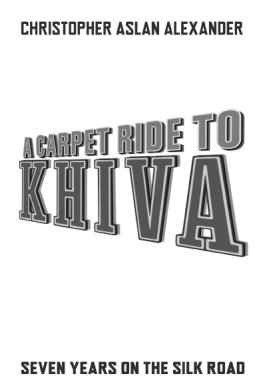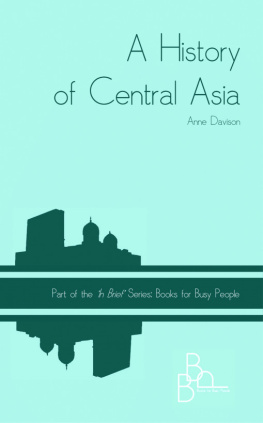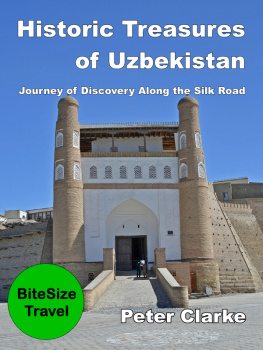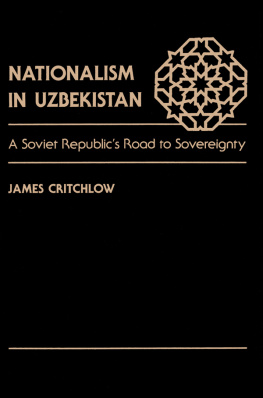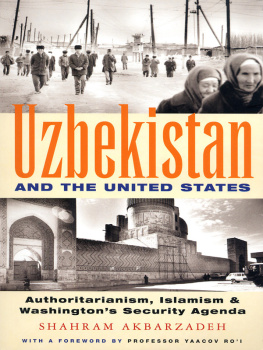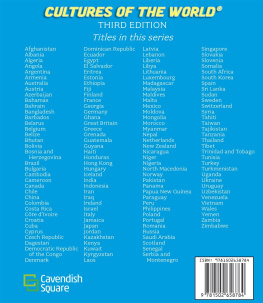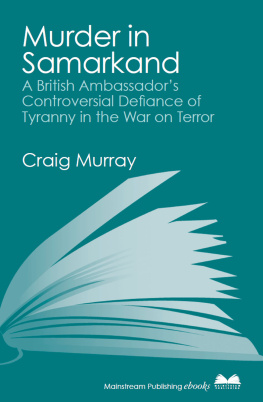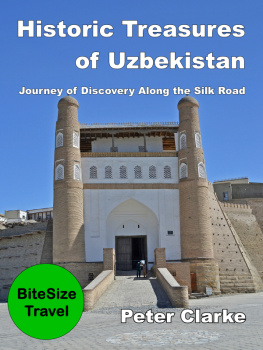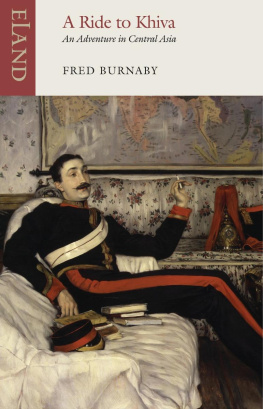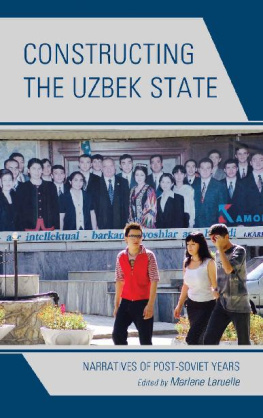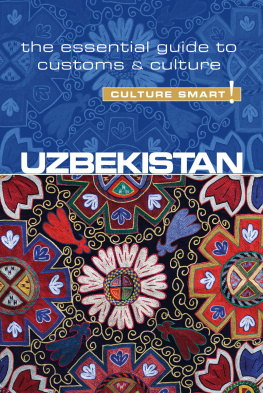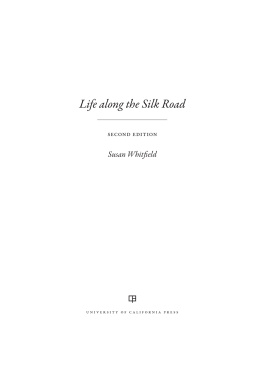The walled city of Khiva
It was now near midnight and the silent, sleeping city lay bathed in a flood of glorious moonlight. The palace was transformed. The flat mud roofs had turned into marble; the tall slender minarets rose dim and indistinct, like sceptre sentinels watching over the city It was no longer a real city, but a leaf torn from the enchanted pages of the Arabian Nights.
J.A. MacGahan, Campaigning on the Oxus,
and the Fall of Khiva , 1874
The amazing thing about working in Khiva, or anywhere else in Uzbekistan, is what you might end up doing, Lukas explained during a recruitment phone call. Youll find yourself doing things youre not qualified to do and would never have the opportunity to do elsewhere. You just do them because no one else is.
Over the next seven years I often thought back on these words, whether holed up in the British Library poring over medieval Persian manuscripts, debating Timurid carpet designs with an Oxford professor, stripped naked and radiated at a former Soviet youth camp, crawling through worm droppings in an attempt to record the silkworms life-cycle, accused of drug-smuggling while attempting to bring sacks of natural dyes out of Afghanistan, or running for cover as an anti-Western riot engulfed the Kabul carpet bazaar.
I had no background in textiles or carpet-weaving and no inkling that this would become my main focus in Khiva. In fact, my only background in carpet-weaving had been a rug-making kit I was given as a child. The rug still languishes, unfinished in an attic somewhere, after I managed to impale the weaving hook into my nose, mid-thrust. It was now 1998 and I had recently graduated from a degree in mass communications, which didnt seem very relevant for life in a Silk Road oasis. Lukas thought otherwise, and was excited to have someone work alongside him. We would be writing the content of an online guidebook about Khiva, requested by the Mayor of Khiva to boost tourism. Lukas was working for Operation Mercy, a Christian humanitarian organisation, and they seemed happy with my qualifications.
There were many reasons to ignore Khiva and look for volunteer possibilities in more hospitable climates. It was a remote desert oasis with freezing winters and simmering summers; I knew that conditions would be basic, and everything that Id heard about Central Asian cuisine had been overwhelmingly negative. I would have to learn a new language and culture, and had never been particularly good at foreign languages. Operation Mercy didnt pay volunteers who were expected to raise their own expenses and an initial commitment of two years felt far too long. My supportive parents reminded me of a note posted in the staff room at my old school for teachers on swimming duty: Beware C. Alexander. Jumps in deep end but cannot swim!
I considered other options, but kept coming back to Khiva. I had been specifically invited there with a project waiting for me that fitted my skills. I appreciated the humanitarian and Christian ethos of Operation Mercy and was impressed with their current work in Khiva among the blind. There was also something very alluring about Khiva and the Silk Road.
I was born in Turkey at one end of the Silk Road, and my parents held a fascination with China at the other end. I was intrigued by the peoples of the Silk Road, particularly those of the former Soviet Union. At school I had studied Soviet Politics, though the course was renamed halfway through due to the Soviet Unions collapse. Before this, I had naively assumed that the term Soviet Union was simply a Communist term for Russia, and had no idea of Tatars, Tajiks, Azeris, Kazakhs or any of the other peoples who called the USSR their home. Now I might be living among them.
It was also at Bedford School that I first heard about Captain Frederick Burnaby. He had attended the school and there was a house named after him. Burnaby, reputedly the strongest man in the British army, was a Victorian hero. Bold, brash and assured of Englands God-given superiority over everyone else, he decided to travel to Khiva in 1876, largely because the Russian authorities had forbidden foreigners access to Central Asia, which they now considered theirs. Burnaby travelled overland on horseback in the middle of winter and narrowly avoided freezing to death en route. He was granted an audience with the Khan, who was shocked to discover that the great Britannia was ruled by a woman. Burnaby had plans to travel through the Turkmen city of Merv and into Afghanistan but was apprehended by the Russian authorities and ordered home. However, his travels gave him enough material for a bombastic bestseller: A Ride to Khiva .
I didnt want to travel to Khiva but to live there. I wasnt sure what to expect and whether any of Burnabys encounters with the natives would be similar to my own. In one respect, though, we were to prove similar: we were both single Englishmen in a culture of arranged marriages, which baffled Khivans as much today as it had back then.
Which do you like best, your horse or your wife? inquired the man.
That depends upon the woman, I replied; and the guide, here joining the conversation, said that in England they do not buy and sell their wives, and that I was not a married man.
What! You have not got a wife?
No, how would I travel if I had one?
Why, you might leave her behind and lock her up, as our merchants do with their wives when they go on a journey.
In my country the women are never locked up.
What a marvel! said the man. And how can you trust them to so much temptation? They are poor weak creatures and easily led. But if one of them is unfaithful to her husband what does he do?
He goes to our mullah, who we call a judge, and obtains a divorce, and marries someone else.
What! You mean to say he does not cut the womans throat?
No; he would be hanged himself if he did.
What a country! said the host; we manage things better in Khiva.
Captain Frederick Burnaby, A Ride to Khiva (1876)
With Burnabys book to guide me, I knew what Khiva had once been like but had no idea what over a century most of it under Soviet rule had done to change the cultural landscape. My initial commitment of two years would extend to seven, before being cut short by deportation. A place I knew only through the eyes of a long-dead British soldier would become home. The bizarre would become familiar, and the exotic would become normal. Soon I would daily roll up my mattress on a balcony that overlooked the minarets and madrassahs of Khivas old city, glowing in the dawn sun, growing used to these scenes from the pages of The Arabian Nights through which Id slipped.
Khiva would leave a huge imprint on my life: toughening me up, humbling me with regular examples of sacrificial hospitality and kindness, broadening me with new friendships and very different perspectives on life. I would find myself not only living on the Silk Road but immersed in a world of silk, discovering indigo blue, madder red, pomegranate gold and the subtle shades of life in a desert oasis. Random strangers would become my second family and an eclectic assortment of characters would be woven together to form a thriving workshop of weavers, dyers and embroiderers. People I might simply have photographed if passing through would become the tapestry of my life. Khiva was a place I would come to love; and then, unexpectedly, Khiva was also a place that would eventually break my heart.
* * *
First, though, there was a compulsory two-month language course in Tashkent, the capital. I had savoured the exotic sound of this name, only to discover a drab, charmless city with no centre, no heart and little visible history. Tashkent had been levelled during an earthquake in the 1960s and rebuilt by the Soviets in swathes of concrete. There was still a sizeable Russian community in the city, making it a contrasting place of mosques and mini-skirts, Russian rap and Uzbek folk music. Tea-houses full of bearded men wearing skull-caps and shrouded in smoke from skewers of sizzling shashlik evoked a timeless image of the Silk Road. Next door, a new Korean pizza restaurant attracted upwardly mobile young Russians and Uzbeks with the Backstreet Boys blaring from the entrance over the clink of vodka glasses.
Next page
